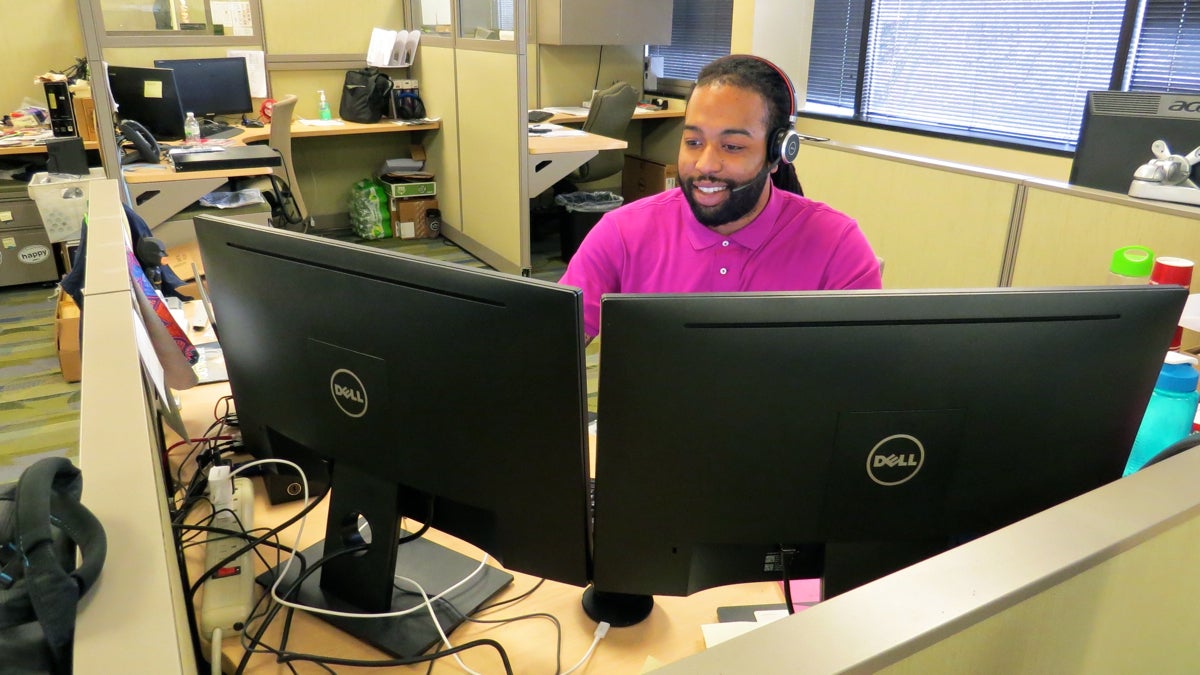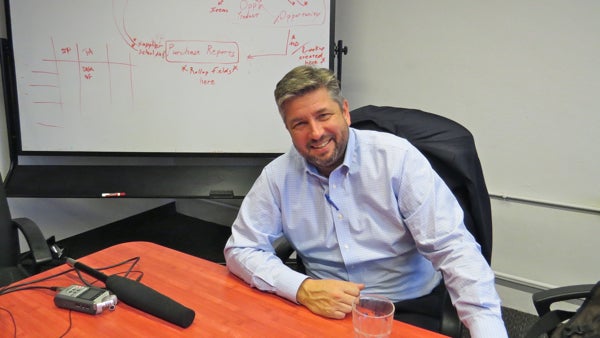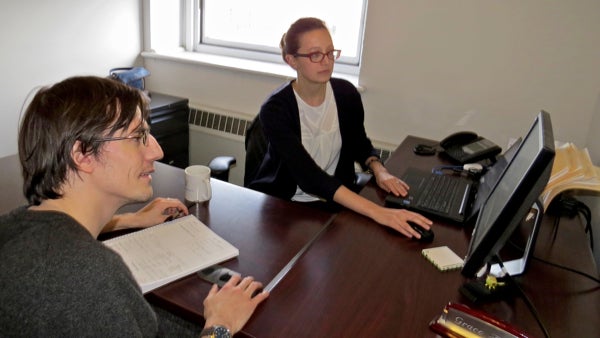Philly-based tech-training program helps young people overcome cycle of poverty
Listen
ITWorks graduate Aundre Chambers had to drop out of college because he couldn't afford the tuition. He now works as an IT service desk analyst at WSFS Bank in Wilmington. (Rob Zawatski/WHYY)
Many people can’t get a degree because they don’t have money.
And they can’t get a job because they don’t have a degree.
One organization headquartered in Philadelphia is offering young people a way to break that cycle by opening the door to an in-demand field without high tuition.
Tech Impact offers tech support to nonprofits. In 2011, it expanded to offer technology-focused workforce development to people 18 to 26, who are out of school, out of work and without a college degree.
“We call it ITWorks because it’s basically teaching young people IT skills — particularly infrastructure-based skills so preparing them for jobs on a help desk or desk-side technicians or in a network operations center,” said Patrick Callihan, executive director of Tech Impact.
Beginning in Philadelphia, ITWorks soon expanded to Delaware and, in 2016, to Las Vegas. The organization differs from other programs aimed at adult learners because it is completely free for students, Callihan said.
“We’re focused on social return so, for us, what’s important is training people and putting them to work,” he said. “Everything we do is centered around that.”
 Patrick Callihan, executive director of Tech Impact. (Rob Zawatski/WHYY)
Patrick Callihan, executive director of Tech Impact. (Rob Zawatski/WHYY)
The program runs on philanthropic support.
Grace Harpole oversees classroom instructors at ITWorks and helps place graduates in jobs. She works with area technology leaders to identify the skills they look for in an entry-level candidate. In addition to technical training, she said, students learn valuable “soft skills” that make them stronger job candidates.
“We bring in volunteers who are leaders in technology in the area to talk to the students about communication and conflict management on the job, help with their resumes, conduct mock interviews,” Harpole said. “I think these skills are really essential for the students — not only in landing their entry-level position but as they move up in their career.”
Finding success after college career is cut short
Aundre Chambers earned some credits at Wesley College in Dover, but had to drop out because he couldn’t afford the tuition. The 24-year-old enrolled into the ITWorks program as an alternative.
“After finishing the program and after meeting everyone that I met and after, you know, getting my job here, I’m a lot more confident,” said Chambers.
He said the practical skills he learned helped him get a job more quickly than if he’d just gone to college. Since the ITWorks program is free, he’s also not saddled with student loans.
Before starting with ITWorks Chambers had limited technical skills. Now, he works as an IT service desk analyst at WSFS Bank in Wilmington, where he was recently named “employee of the month.”
“I’m fixing computers. I’m working in Active Directory. I’m restarting SQL Servers. You know? I’m configuring databases,” he said. “So, it’s definitely a 180-degree difference from before I started till now.”
After years of working in the service industry, Chambers said he never imagined he would have a tech career. His friends quickly wanted to know if they could follow in his footsteps.
“Some have … the jobs I had before this — the manual jobs, the construction jobs. Actually, four of my friends just graduated the program after me,” he said.
Partnering with community, stepping up for individuals
Oliver Withstandley, the instructor for the Delaware class of ITWorks, said many of his students live in poverty and sometimes need help outside of formal instruction.
“Are their social-emotional needs … being met too? Right? And are they OK out of the classroom because, if they aren’t OK outside of the classroom, they’re not going to perform well in the classroom,” he said.
 Grace Harpole, who oversees classroom instructors at ITWorks and helps place graduates in jobs, works with instructor Oliver Withstandley. (Rob Zawatski/WHYY)
Grace Harpole, who oversees classroom instructors at ITWorks and helps place graduates in jobs, works with instructor Oliver Withstandley. (Rob Zawatski/WHYY)
Withstandley said he makes sure his students who need help have access to resources. And he lets them know what they can do to overcome certain obstacles.
Meanwhile, ITWorks partners with community groups to identify students, but most new students are referred by recent graduates. Potential students undergo a rigorous interview process to help determine if they have what it takes to stick with it and finish the program.
“It’s not always super fun … I like learning binary, but not everybody likes binary, and so it could be really boring for someone,” said Withstandley. “How do they get through that task and not want to quit?
The 16-week spring semester for ITWorks begins next month; another one starts in the fall.
WHYY is your source for fact-based, in-depth journalism and information. As a nonprofit organization, we rely on financial support from readers like you. Please give today.




